
Representatives of several faith-based organizations and Christian denominations – including Bishop John Harvey Taylor of the Episcopal Diocese of Los Angeles – gather outside the U.S. Border Crossing Station at Calexico, California, to ask for immediate processing for a group of refugee families waiting to be united with children detained inside the U.S.
Los Angeles Bishop John Harvey Taylor and other faith leaders were praying for a miracle as they gathered March 2 at the U.S. border in Calexico, California.
They prayed that deported families who were granted asylum, yet were being detained in Mexico, be allowed to enter the U.S. and reunite with separated children and family.
And it happened.
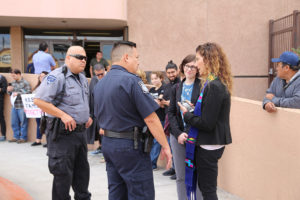
The Rev. Alexia Salvatierra, an Evangelical Lutheran Church in America and immigration justice activist, confers with Border Patrol officers, who shooed the protesters off border station property, but also agreed to raise the protesters’ concerns with their superiors. Photo: Janet Kawamoto
Outside the gates
Against a backdrop of clanging metal gates, people crossed into Mexico unencumbered, while throughout the day the activists, representing a variety of Christian denominations and faith organizations, sang, prayed, and held aloft signs reading: ‘Keep Families Together’.
Curious passersby stopped to watch in the 80-degree heat, often voicing support, while border patrol agents ordered the vigil to move away from the entrance of the U.S. Border Inspection Station.
Taylor and others asked to speak with border station officials and eventually were able to get through to a supervisor by phone to request that the families be allowed to enter Calexico.
The activists had sought to gain entry for the families at Calexico, which typically is less busy than some other border crossings, like the San Diego-Tijuana border, according to the Rev. Alexia Salvatierra, an ELCA (Evangelical Lutheran Church in America) pastor and long-time immigration rights activist who helped organize Saturday’s vigil.
“The courts in the U.S. have already ruled that these families belong together,” Salvatierra said in an email to vigil participants. “The government has reunited multiple families but these parents have been deported without the opportunity to apply for asylum and were more difficult to locate.”
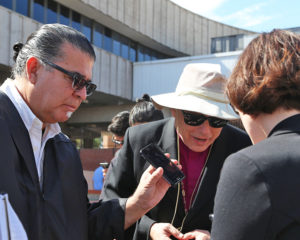
Bishop John Harvey Taylor speaks by phone with a Border Patrol supervisor, who agreed to raise the faith leaders’ concerns with her superiors. Photo: Janet Kawamoto
“We have seen Central American families extorted, attacked and trafficked. These children and parents are also unnecessarily suffering the trauma of separation from each other—a trauma which needs to end as soon as possible.”
Inside the gates
For many of the families, speaking publicly about their plight increases vulnerability, Salvatierra said.
Like Arnol and Idilia Flores, who fled Honduras after authorities burned their home and all their possessions, according to Arnol Flores.
“They beat me,” he said through an interpreter, as his wife Idilia wept. “They fractured my skull.”
Along with Yuliana, their 14-year-old daughter, they had waited since early morning in the sweltering heat at the Mexicali border, trying to gain entry to Calexico.
Their hope: to be reunited with their 16-year-old son, from whom they have been separated for a year. He is living in a foster home in the Bronx, New York, Flores said.
The Flores family met with Bishop John Taylor, who crossed the border into Mexicali, to offer them support and encouragement, as they will be staying with a family from St. Andrew’s Episcopal Church in Ojai
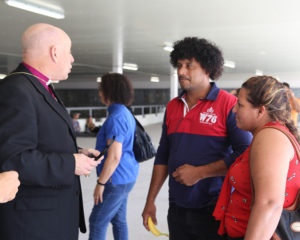
Bishop John Harvey Taylor speaks with the Flores family, who after obtaining refugee status will stay with a family from St. Andrew’s Episcopal Church, Ojai. Photo: Janet Kawamoto
“I’m here to drive them to their new home,” said the Rev. Greg Kimura, St. Andrew’s rector, who had been waiting with the group of 29 families since early morning.
Each of the families has a sponsoring host and a place to live once they are admitted into the country, according to Sandra Ovalle, immigration campaign coordinator for Sojourners in Washington, D.C. She has worked in immigration advocacy and church mobilization with Matthew 25/Mateo 25 and World Relief in Southern California and has been involved in campus ministry among Latinx college students in Texas and California.
Late Saturday, Taylor said he had received word the families had gained entry. “There was a flash of hope at sundown on Saturday thanks to the careful planning of Al Otro Lado and its partners, the patience and courage of the families who came back to the border, and the officials who found a way to give them a hearing,” Taylor said in a text message to The Episcopal News.
“It was a privilege and a blessing to bear witness. Let’s continue to pray and work until all the asylum seekers have been heard and all the families reunited.
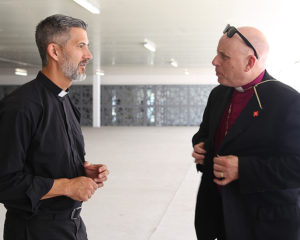
Greg Kimura, rector of St. Andrew’s Church, Ojai, and Bishop John Harvey Taylor discuss next steps to take in securing admission to the U.S. for refugee families. Members of St. Andrew’s will host one of the refugee families once they are admitted to the United States and cleared for asylum proceedings. Photo: Janet Kawamoto
On March 5, Kimura confirmed that the Flores family was indeed permitted to enter the country, but added that “they’ve gone into this black hole of bureaucracy and we have no idea what the situation is or what their status is now.”
He said that organizing is underway at St. Andrew’s to offer support and assistance to the entire family “once the bureaucracy works its magic” and the Floreses are released.
“We are taking the attitude that it takes a village,” said Kimura, who added that the church has a history of hosting other asylum-seeking families.
“They’ve hosted a family from Africa and they hosted a Vietnamese refugee family in the 1970s. There’s been a tradition here of doing this and the community has really responded well. We’ve had members of the Jewish community and a couple of Buddhist folks who were at the meeting on Sunday and we’re looking for assistance and help from everyone.”
The Flores family may also need counseling to assist with the trauma of separation from their son, who has a hearing disability, and from living as refugees, Kimura said. “The family’s been apart from their son for a year, they may have transition and trauma issues, from the way they were treated by the Mexican and U.S. governments.
“We are trying to arrange a bilingual family counselor to help with any issues that pop up.”
A dozen or so St. Andrew’s families are also offering to aid the family’s acclimation to their new lives—keeping appointments with immigration or enrolling their daughter in school, with shopping, English as Second Language classes, things that will facilitate a successful integration into the U.S.
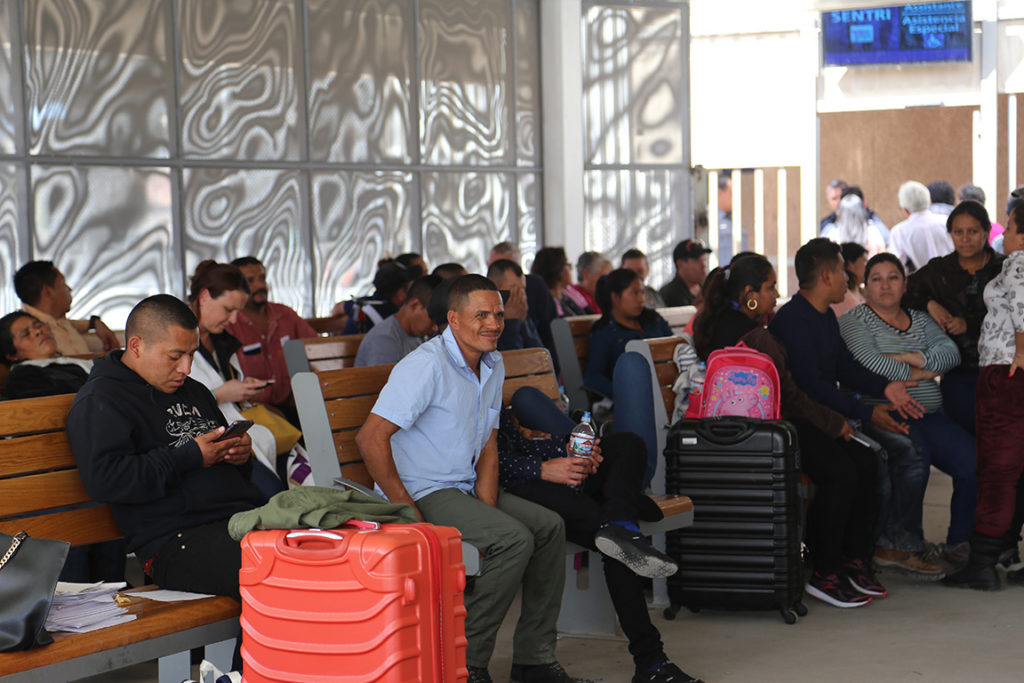
Refugee families await permission to enter the United States, where they hope to be reunited with their children who were detained when they previously attempted to apply for asylum. Due to the efforts of several faith-based organizations, all have sponsors and homes awaiting them in the U.S. Photo: Janet Kawamoto
“I’ve been really amazed, at how generous and thoughtful people are being and how compassionate,” Kimura added. “They’re willing to help out, instilling a lot of inspiration and hope. When the Flores family gets here they will find a very welcoming family community.”
At least one of the 26 families was released from detention March 4 to go to their host locations, according to Ricardo Diaz of Al Otro Lado (translated as To the Other Side), a vigil organizer and immigrant rights organization.
But Virginia Ericsson, the St. Andrew’s parishioner who is hosting the Flores family, said on March 5 that she is still in a holding pattern, waiting and wondering about them.
“I’m keeping my phone open, for ICE to call,” she told the Episcopal News. “I’m just waiting for a call from them, to tell me what the next step is.”
UPDATE, March 6, 10:00 p.m.
From the Rev. Greg Kimura: “The Flores family, seeking asylum from Honduras, was processed and released from ICE detention,” he wrote. “We should hear from the case manager tomorrow about next steps. Before too long, they should be settled with a St. Andrew’s [Ojai] parishioner.
“Towards that end, we will have a presentation on 11 am, Sunday, by Deacon Catherine Wagar and Bruce Wagar, who have hosted three asylum-seeking families. They will share their experience and advice.
“This is not a just a church thing. We will discuss how we all can help the family, who has been through war-like trauma as well as separation from their 16 year old son, adjust to life in the US and integrate with the Ojai community.”
